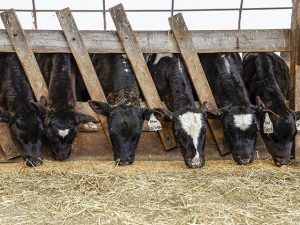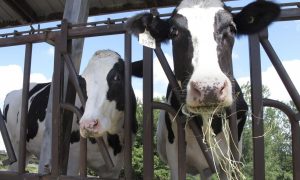
The Senate will vote first and intends to pass the measure before Thursday, leaving the House no time to demand changes before the Christmas holiday.
Here are the details that might impact your farm:
Disaster Relief
• $250 million in aid to rice producers and $100 million to cotton merchandisers to make up for losses related to the pandemic or supply chain disruptions. USDA previously provided $80 million in aid to textile mills and other cotton users. For rice, USDA would determine payment rates based on yield history and acreage.
• $40.6 billion for drought, hurricanes, flooding, wildfire, natural disasters and other matters — $3.7 billion in disaster aid for farmers to cover 2022 crop and livestock losses.
Food Aid
• Funds two programs that provide foreign food aid. These include the Food for Peace Program (PL 480), which is funded at $1.8 billion, and the McGovern-Dole International Food for Education Program, which is funded at $248 million, for an increase of $11 million over fiscal year 2022.
• Summer Meals Program Modernization: Updates the summer food service program to permanently allow states to provide non-congregate meals and summer electronic benefit (EBT) options nationwide to eligible children in addition to meals provided at congregate feeding sites. Non-congregate meals, such as grab-and-go or home delivery, would be provided in rural areas to eligible children, and summer EBT benefits would be capped at $40 per child per month. This provision is fully offset and based largely on the Hunger-Free Summer for Kids Act, which Boozman authored and introduced earlier this Congress.
• Supplemental Nutrition Assistance Program (SNAP) EBT Skimming Regulations and Reimbursement: Requires USDA to coordinate with relevant agencies and stakeholders to investigate reports of stolen SNAP benefits through card skimming, cloning and other similar fraudulent methods. This provision aims to identify the extent of the problem, develop methods to prevent fraud and improve security measures, and provide replacement of benefits stolen through these fraudulent actions.
Conservation
• Cracks down on “conservation easements,” which allow tax breaks when land is dedicated for conservation purposes. The IRS has identified the transactions as a method for avoiding taxes. The conservation easement provision was expected to raise between $6 billion and $7 billion.
• SUSTAINS Act: Enacts a House bill that allows corporations and other private entities to contribute funding for conservation projects and authorizes USDA to match up to 75% in matching the donations.
Inputs
• Pesticide Registration Improvement Act (PRIA 5) Reauthorization: Reauthorizes pesticide registration and review process user-fee programs administered by the Environmental Protection Agency (EPA) and increases registration and maintenance fees to support a more predictable regulatory process, create additional process improvements, and provide resources for safety, training, bilingual labeling, and other services to advance the safe and effective use of pesticides.
• Pesticide Registration Review Deadline Extension: Extends deadline for EPA to complete registration review decisions for all pesticide products registered as of October 1, 2007. EPA is facing a significant backlog of pesticide registrations due to a variety of factors over the past several years, which raises potential implications for continued access to numerous crop protection tools. The agency will be allowed to continue its registration review work through October 1, 2026, as a result of this extension.
Climate
• Growing Climate Solutions Act: Incorporates updated language from the Growing Climate Solutions Act, which directs USDA to establish a program to register entities that provide technical assistance and verification for farmers, ranchers and foresters who participate in voluntary carbon markets with the goal of providing information and confidence to producers.
Farm Business
• $1.92 billion for farm programs, which is $55 million above the fiscal year 2022 enacted level. This includes $61 million to resolve ownership and succession of farmland issues, also known as heirs’ property issues. This funding will continue support for various farm, conservation, and emergency loan programs, and help American farmers and ranchers. It will also meet estimates of demand for farm loan programs.
• Funding for specialty crops and remarks on crop insurance/A&O. Some $25 million is being made available for specialty crop equitable relief and report language directing USDA to use its legal authority to index all A&O (crop insurance program) for inflation and provide equitable relief for specialty crops going forward.
Livestock
• Livestock Mandatory Reporting Extension (LMR) Extension: Extends livestock mandatory reporting requirements until September 30, 2023. LMR requires meat packers and importers to report the prices they pay for cattle, hogs, and sheep purchased for slaughter and prices received for meats derived from such species to USDA who then publishes daily, weekly, and monthly public reports detailing these transactions.
Markets
• Commodity Futures Trading Commission (CFTC) Whistleblower Program Extension: Enables CFTC to continue payment of salaries, customer education initiatives and non-awards expenses related to the whistleblower program to ensure it can continue to function even when awards obligated to whistleblowers exceed the program fund’s balance at the time of distribution.
Some ag sector items that did NOT make the omnibus package:
Nothing for the proposed farmworker labor reforms from Sen. Michael Bennet (D-Colo.) and others. The bill also left out legislation to reform cattle markets or appoint a special investigator at USDA to investigate possible anti-competitive behavior in the meatpacking sector.
We’ll be updating this article as more details become available.























